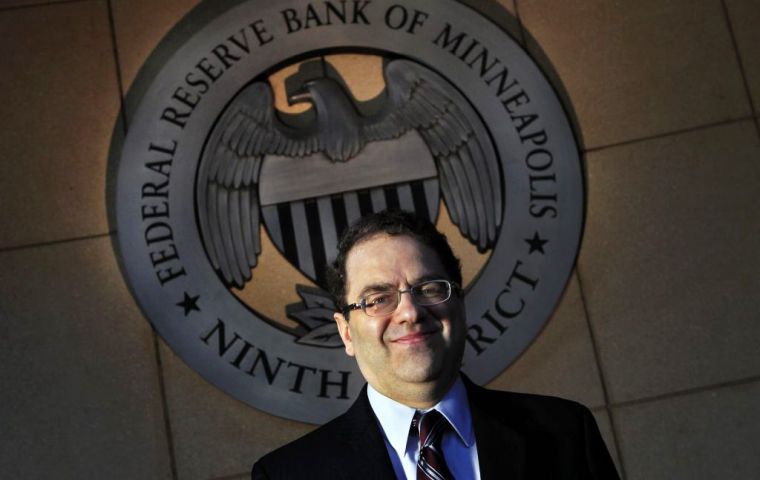MercoPress. South Atlantic News Agency
Fed minutes confirm a retreat from easy monetary policy; concerns regarding job creation
 Fed member Narayana Kocherlakota said he did not think the Fed's preferred measure of inflation would reach 2% until 2018
Fed member Narayana Kocherlakota said he did not think the Fed's preferred measure of inflation would reach 2% until 2018  Stanley Fischer, the former Bank of Israel governor was confirmed by the US Senate and should be present at the Fed meeting
Stanley Fischer, the former Bank of Israel governor was confirmed by the US Senate and should be present at the Fed meeting Federal Reserve policymakers last month began laying groundwork for an eventual retreat from easy monetary policy with a discussion of how to best control interest rates as they remove trillions of dollars from the financial system.
No final decisions were taken, and minutes of the session, released on Wednesday, said the Fed was merely engaged in “prudent planning” and not signaling it was ready to “normalize” monetary policy or raise interest rates any time soon.
Still, the discussion at the central bank's April 29-30 policy-setting session, coupled with fresh comments by top officials, show an intensifying discussion over both exit-strategy details and a developing split over basic analysis of the US economy.
The next policy meeting will be in mid-June, when the panel will be joined by Stanley Fischer, the former Bank of Israel governor whose nomination to the Fed's board was confirmed by the US Senate. The Senate has yet to act on his separate nomination to be Fed vice chairman.
Though the economic forecasts reviewed at the April meeting remained upbeat, the minutes indicated general agreement that any sustained uptick in inflation was still perhaps years off.
Minneapolis Fed President Narayana Kocherlakota said he did not think the Fed's preferred measure of inflation would reach 2% until 2018, an argument for leaving loose monetary policy in place. He said the economy's struggle to regain steam might even argue for easing policy further by committing to drive inflation above the Fed's 2% target to make up for lost ground.
Participants in the meeting undertook an apparently wide-ranging discussion about US labor markets, dissecting research that suggests a falling share of short-term unemployed could prove an inflationary spark even with long-term joblessness running unusually high - a finding a number of officials said they considered suspect.
Indeed, sluggish wage gains were cited as one indication that the labor market could have more slack than the nation's 6.3% jobless rate suggests.
Other officials, however, offered warnings. “Some participants reported that labor markets were tight in their districts or that contacts indicated some sectors or occupations were experiencing shortages of workers,” the minutes reported.




Top Comments
Disclaimer & comment rules-

Read all commentsno new world order yet then?
May 22nd, 2014 - 12:39 am 0Commenting for this story is now closed.
If you have a Facebook account, become a fan and comment on our Facebook Page!